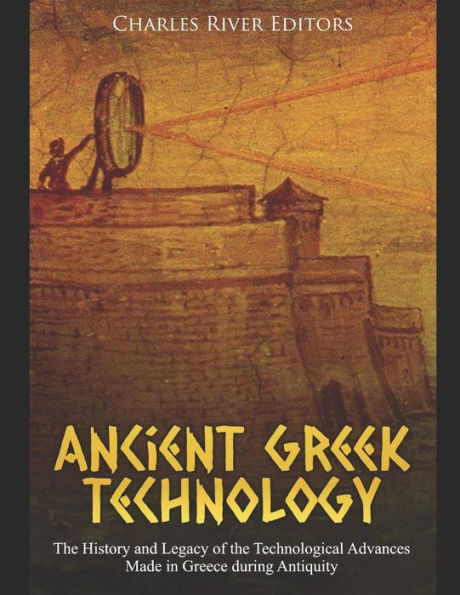1
/
of
1
Independently published
Ancient Greek Technology: The History and Legacy of the Technological Advances Made in Greece during Antiquity
Ancient Greek Technology: The History and Legacy of the Technological Advances Made in Greece during Antiquity
ISBN-13: 9781798758090
Regular price
$13.89
Regular price
Sale price
$13.89
Unit price
/
per
Couldn't load pickup availability
*Includes pictures *Includes ancient accounts *Includes online resources and a bibliography for further reading "What I would prefer is that you should fix your eyes every day on the greatness of Athens as she really is, and should fall in love with her. When you realize her greatness, then reflect that what made her great was men with a spirit of adventure, men who knew their duty, men who were ashamed to fall below a certain standard. If they ever failed in an enterprise, they made up their minds that at any rate the city should not find their courage lacking to her, and they gave to her the best contribution that they could." - The Funeral Oration of Pericles, quoted by Thucydides In virtually all fields of human endeavor, ancient Athens was so much at the forefront of dynamism and innovation that the products of its most brilliant minds remain not only influential but entirely relevant to this day. In the field of medicine, the great physician Hippocrates not only advanced the practical knowledge of human anatomy and care-giving but changed the entire face of the medical profession. The great philosophers of Athens, men like Aristotle, Socrates, and Plato, interrogated themselves with startling complexity about the nature of good and evil, questioned the existence of divinity, advocated intelligent design, and went so far as to argue that all life was composed of infinitesimal particles. Great architects and sculptors such as Phidias produced works of art of such breathtaking realism and startling dynamism that they later formed the driving force behind the resurgence of sculpture during the Renaissance and served as masters to artists such as Michelangelo, Bernini, and Donatello. The plays of dramatists such as Aristophanes not only displayed an acerbic wit and a genius for political satire so pronounced that their works continue to be performed - and topical - to this day, but served as the inspiration for virtually all playwrights from Shakespeare to the present day. And this does not take into account the host of equally brilliant mathematicians, natural philosophers, historians, astronomers and politicians that the city's great schools nurtured and produced. The flowering of Greek civilization was further made possible by an increase of trade between the cities and with other civilizations. Trade became a major occupation on account of the scarcity of agricultural land in the largely mountainous regions of the Balkan peninsula. The polis of Athens, in particular, assumed economic dominance in the Aegean in from the sixth-century BC. The consequent increase in wealth, resources and population made a cultural renaissance possible. Commerce, in turn, led to the rise of an affluent aristocratic class which had the leisure to devote itself to learning, philosophy, and art. It also led to an industrial class of freemen who were artists and craftsmen. Religion also played a role in the development of Greek culture and technology. The ancient Greeks worshipped a multiplicity of gods, the chief of which dwelt on Mount Olympus in the first mountainous region of central Greece. The city-states would regularly send athletes to compete in the Olympic Games in their honor. Thales of Miletus (c.524 - 546 BC), named by the classicist John Burnet "the first scientist," observed the natural world and sought rational explanations for it. From him a tradition emerged which explored the world and the actions of humans through natural science, reason, mathematics, metaphysics, and ontology. After Thales a stream of philosophers, mathematicians and engineers emerged including names that are well known today, including Plato, Aristotle, Socrates, Pythagoras, Archimedes, Heraclitus, Epicurus, Diogenes, and Plutarch.
- | Author: Charles River Editors
- | Publisher: Independently published
- | Publication Date: Mar 04, 2019
- | Number of Pages: 62 pages
- | Language: English
- | Binding: Paperback
- | ISBN-10: 1798758091
- | ISBN-13: 9781798758090
Share


